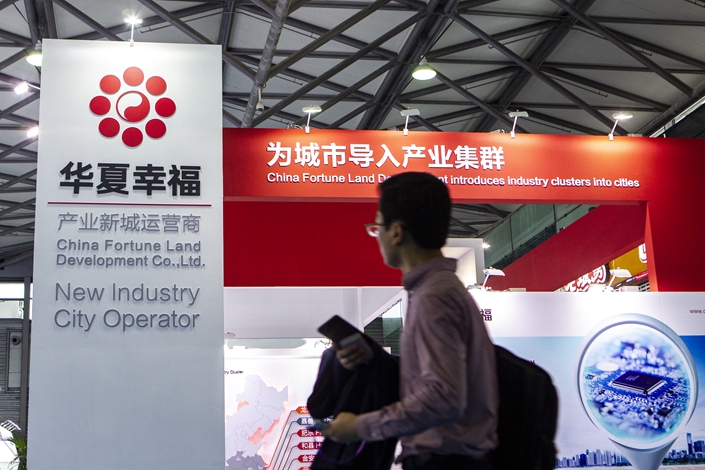How Cash-Hungry Property Developers Are Skirting Curbs on Trust Loans

Struggling under a mountain of debt and loan guarantee obligations, China Fortune Land Development Co. Ltd., one of China’s biggest property developers, is raising as much as 6 billion yuan ($843 million) through a series of transactions that effectively allow it to skirt government restrictions on real-estate lending by trust companies.
The Shanghai-listed builder has provided guarantees for two perpetual subordinated loans made by Citic Trust Co. Ltd. and Zhongyuan Trust Co. Ltd. to Jiutong Jiye Investment Co. Ltd., a subsidiary company, it said in separate announcements to the stock exchange on Sept. 4 and Saturday. The loan from Citic Trust will be no more than 2 billion yuan while Zhongyuan Trust’s credit will not exceed 4 billion yuan, the company said.
Jiutong Jiye, which reported revenue of around 300 million yuan and a net loss of 150 million yuan in the first half of 2019, will use the money to invest in private-public-partnership (PPP) property projects and repay its debt, the statements said. Jiutong Jiye is a key subsidiary of China Fortune Land responsible for land development and the construction of infrastructure projects. It is also the group’s main vehicle for PPP projects, and has been caught up in the difficulties that have plagued the industry as the government has tightened supervision and regulation.
The loan guarantees add to the already onerous debt obligations faced by China Fortune Land. Its total guarantees, including those of its subsidiaries, amount to 135.6 billion yuan, the company said in a separate statement on Saturday, more than three times its net asset value. The company’s latest half-year earnings report showed its liability-to-asset ratio, which defines the total amount of a company’s debt relative to assets was 88.2% at the end of June 2019, up from 86.7% from the end of 2018 and 81.1% in 2017.
Financial strain
At the end of March, China Fortune Land had outstanding liabilities of 377.9 billion yuan including 170.9 billion yuan of interest-bearing debt, 15.8% higher than at the end of 2018, according to Golden Credit Rating International Co. Ltd., a Beijing-based credit ratings firm.
Chinese property developers have come under increasing financial strain as the government has squeezed their access to borrowing as part of a campaign to rein in housing prices. The central bank has told banks to limit lending to real estate companies and the banking regulator has restricted trust companies’ ability to hand out credit.
A perpetual subordinated loan is a type of debt that has no repayment date and in which the borrower pays interest forever, or until it chooses to pay back the capital. It is classified as junior debt because it it is low in the pecking order of repayment if the borrower defaults. As a result of the higher risk, perpetual bonds tend to have very high rates of interest — the two loans China Fortune Land announced last week carry an initial annual interest rate of 9.5%. That is more than double the current one-year benchmark lending rate of 4.35%.
Because perpetual loans do not ever need to be repaid, accounting regulations allow them to be treated as equity rather than debt on a company’s balance sheet. That has allowed the trust companies to skirt regulatory limits on the scale and growth of loans to developers. The classification also helps, at least on paper, to reduce a company’s liability-to-asset ratio.
Many Chinese companies have turned to perpetual loans, including state-owned China Merchants Group Ltd. and China Evergrande Group. China Fortune Land has also previously taken out perpetual loans from trust companies to shore up its finances. In 2017, when it was caught in a liquidity crunch, it organized three perpetual loans from three trust firms amounting to a total of 5.5 billion yuan.
Contact Reporter Guo Yingzhe (yingzheguo@caixin.com)

- PODCAST
- MOST POPULAR




